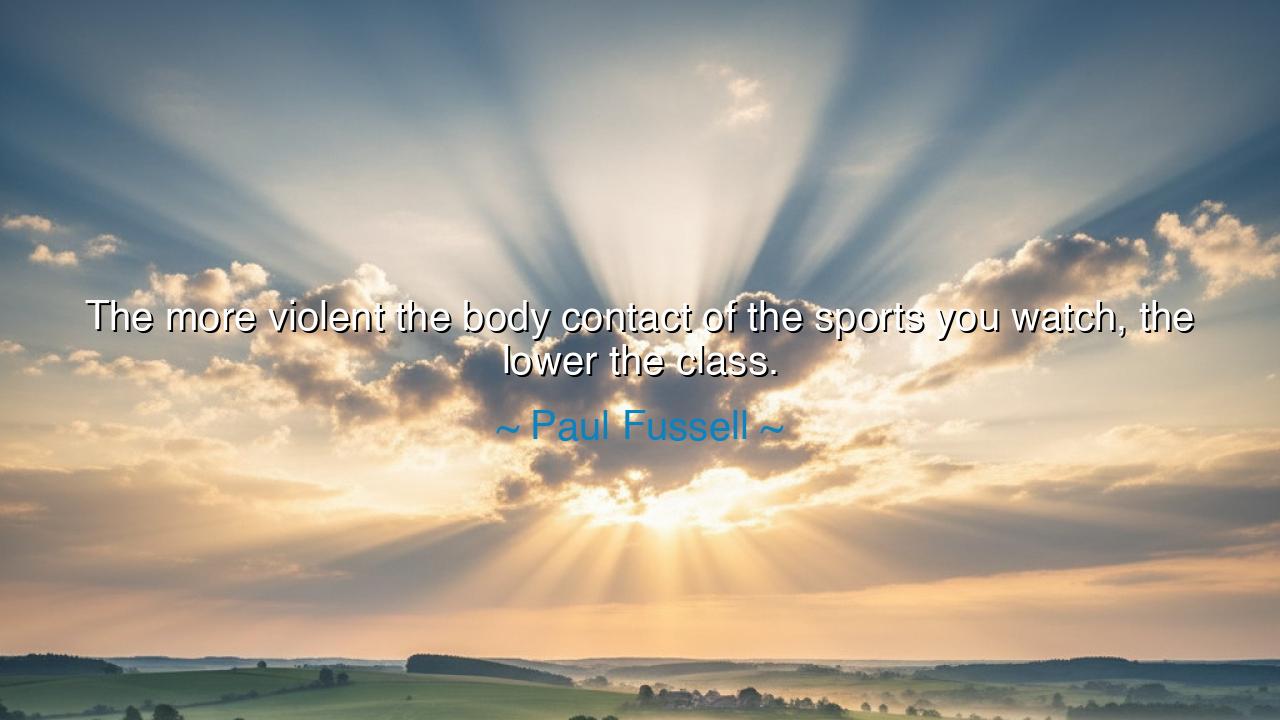
The more violent the body contact of the sports you watch, the






When Paul Fussell declared, “The more violent the body contact of the sports you watch, the lower the class,” he was not simply offering a commentary on games of strength and collision. He was unveiling a mirror to society, revealing how our pleasures betray our values, and how the spectacles we cherish disclose the measure of our refinement or our coarseness. His words are not condemnation alone, but an invitation to reflect on why we are drawn to violence in play, and what it says about the spirit within us.
The ancients knew this truth, though they lived it with fierce clarity. In Rome, the Colosseum roared with the cries of gladiators and beasts. The crowds, hungry for blood, demanded death as entertainment. To sit among them was not to elevate the soul, but to be carried downward, into the realm of instinct and cruelty. Meanwhile, in Greece, though contests were fierce, the Olympic Games elevated the spirit through skill, speed, and endurance rather than slaughter. Fussell’s observation echoes this divide: the more we crave violent contact, the less our spirit is raised toward contemplation and harmony, and the more it is chained to primal hunger.
Yet we must not mistake his words as disdain for all roughness or trial. For in every era, there has been honor in testing the body and enduring pain. The soldier drills with arms, the worker strains against stone, the runner fights against his own limits. These are struggles of growth. Fussell warns instead against the delight in watching violence for its own sake, where the audience is intoxicated by collision and blood rather than uplifted by courage or beauty.
History offers a tale in the decline of Rome. The philosopher Seneca wrote with sorrow of citizens who once honored statesmen and poets, but who came to love nothing more than the sight of men torn apart in the arena. He declared that the people were growing brutal, losing their taste for wisdom, because their eyes were fixed on cruelty disguised as sport. This same warning lives in Fussell’s words: the more violent the entertainment we consume, the more it reflects not refinement but degradation.
His mention of class is not only about wealth or status, but about the refinement of the spirit. True nobility is not measured by coin, but by the dignity of what the heart chooses to love. Those who seek spectacle in grace, teamwork, strategy, and artistry elevate their souls. Those who revel only in destruction reveal that their spirits remain ungoverned by wisdom. Thus, his teaching is not about exclusion, but about aspiration—about lifting ourselves toward higher tastes.
The lesson for us is clear: be mindful of what you delight in, for it shapes who you become. If you revel in cruelty, cruelty takes root in you. If you admire beauty, strength, and skill, your own spirit will grow in harmony with them. Choose entertainments that uplift, not degrade; for the soul is nourished by what it consumes. Just as the body becomes what it eats, the heart becomes what it watches.
Practically, this means cultivating discernment in the spectacles we allow before our eyes. Watch games that test courage without glorifying brutality. Celebrate contests that honor discipline and mastery. Seek arts, sports, and stories that raise your spirit toward light, not drag it into shadow. And teach the young that true greatness is not found in the lust for blood, but in the love of wisdom, skill, and courage.
Thus, Paul Fussell’s words ring as a timeless admonition: the violence you crave reveals the class of your spirit. Do not descend to the pit, where men cheer for blood, but rise to the arena of nobility, where the heart is elevated by what it beholds. For in choosing what we watch, we also choose what we are becoming. And the wise will always seek that which refines, strengthens, and ennobles the soul.






AAdministratorAdministrator
Welcome, honored guests. Please leave a comment, we will respond soon